Best Mobile CRM Software for Teams Working on the Go
TL;DR
• Mobile CRMs help you respond faster, prep on the go, and never miss a follow-up.
• We tested 20+ apps across iOS and Android—7 stood out for usability and real mobile power.
• Picks range from free CRMs with strong apps to enterprise-grade systems with offline sync.
Work doesn’t wait for you to get back to the office. Calls come in while you’re in transit, deals move forward during client lunches, and reminders don’t care that you’re on a plane. A mobile CRM isn’t just a “nice-to-have” anymore—it’s your pocket-sized command center.
We put more than 20 CRM apps through daily use—logging calls from iPhones, pulling up contact histories on Android, and testing offline mode in spotty Wi-Fi. Only seven apps delivered the kind of speed, clarity, and reliability you can trust on the move.
In this guide, you’ll find mobile CRMs that fit different needs—fast setup, deep customization, AI nudges, or simply the best free option. By the end, you’ll know which app deserves a spot on your home screen.
The best mobile CRM apps in 2026
- HubSpot CRM for a free, all-in-one mobile CRM
- Zoho CRM for customizable pipelines with strong mobile tools
- Pipedrive for visual deal tracking on your phone
- Freshsales for AI lead scoring
- Salesforce Sales Cloud for enterprise-grade mobility
- monday CRM for combining mobile sales and task management
- Copper CRM for Google Workspace users
Key features to look for in mobile CRM apps
How we evaluate and test mobile CRM software
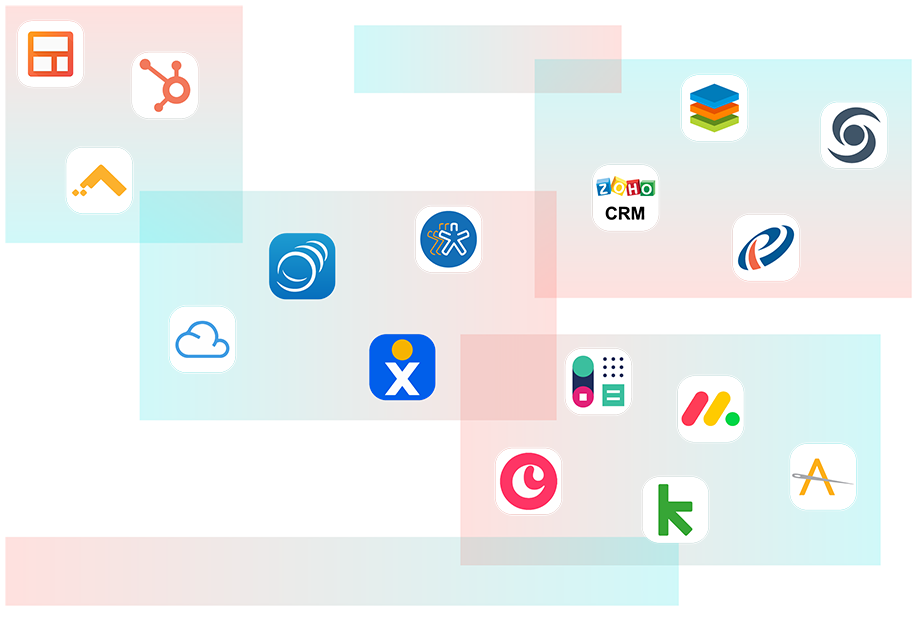
For every mobile CRM we review, we signed up, created accounts, and built test pipelines. We imported sample contacts, synced calendars, and ran daily workflows right from our phones—logging calls after meetings, pulling up histories before sales reviews, and checking dashboards mid-commute.
This way, you’re getting insight into how each app actually behaves in the real world.
Criteria we focused on:
- Ease of use: Can you pick it up and get moving in under 30 minutes?
- Core mobile features: Pipelines, contact records, task reminders, and activity logging that actually work on a phone.
- Integrations: Smooth sync with Gmail, Outlook, calendars, and collaboration tools without messy workarounds.
- Offline access: Does the app still function when service drops, or do you lose track of work?
- Unique perks: AI nudges, widgets, or voice-to-text that make mobile use faster and less stressful
CRM for mobile apps comparison
At-a-glance comparison
Tool | Best for | Free plan | Upgrade pricing* |
HubSpot CRM | Free CRM that scales | Yes | From $15/user/mo |
Zoho CRM | Customizable pipelines | Yes | From $14/user/mo |
Pipedrive | Visual, drag-and-drop pipelines | No | From $14/user/mo |
Freshsales | AI lead scoring | Yes | From $9/user/mo |
Salesforce | Enterprise sales ops | No | From $25/user/mo |
monday CRM | Sales + project tasks | No | From $12/user/mo |
Copper CRM | Google Workspace users | No | From $25/user/mo |
Best mobile CRM for a free plan that scales
HubSpot CRM
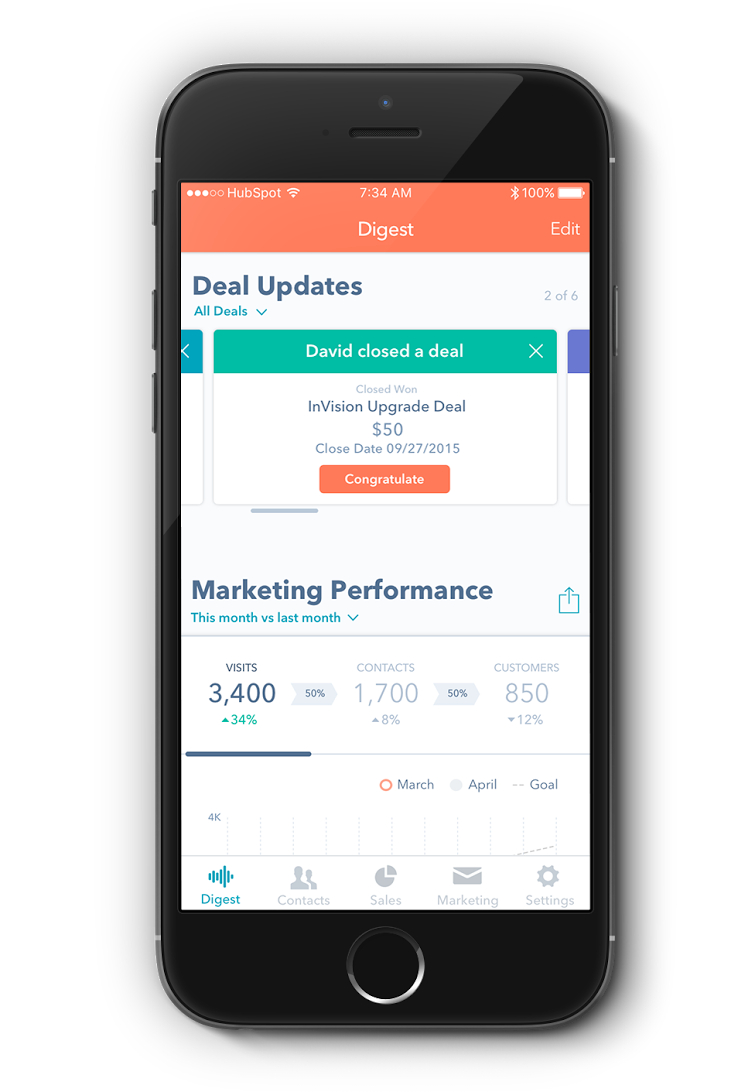
Image Source: HubSpot
Pros
- Free forever plan with pipelines, tasks, and contact records
- Clean mobile app that mirrors desktop features well
- Strong Gmail, Outlook, and calendar integrations
Cons
- Advanced automation and reports locked behind paid tiers
- Can feel heavy if you only need basic contact tracking
HubSpot’s mobile app makes a strong case for being one of the easiest CRMs to get started with. Dragging deals through stages feels natural on mobile, and the contact records are detailed without being cluttered. Task reminders and activity logs keep everything tied together so you’re not juggling sticky notes or separate apps.
Integration is where HubSpot really shines. Gmail and calendars synced instantly, and every email or meeting flowed into the right contact record. That kind of automatic logging cuts out tedious double entry and gives you confidence nothing will slip through.
Offline access also works surprisingly well. You can jot down notes or update tasks mid-flight or underground, and everything syncs once you’re back online.
The app also adds thoughtful touches. Nudges appear when follow-ups go quiet, and the mobile dashboards show just the essentials—deal progress, open tasks, upcoming meetings—without overwhelming you.
But HubSpot isn’t perfect. The free plan is generous, yet the moment you want advanced reporting, forecasting, or deeper automation, you’re steered toward paid tiers. Still, if you’re looking for a mobile CRM that’s approachable, polished, and capable of scaling, HubSpot is one of the most reliable options.
Pricing
Free forever plan for 2 users. Paid plans start at $15/user/month, billed annually.
Helpful next steps
- Read our HubSpot CRM Review
- Sign up for the HubSpot CRM free plan
Visit site
Go to HubSpot's official website
Best mobile CRM for customizable pipelines
Zoho CRM
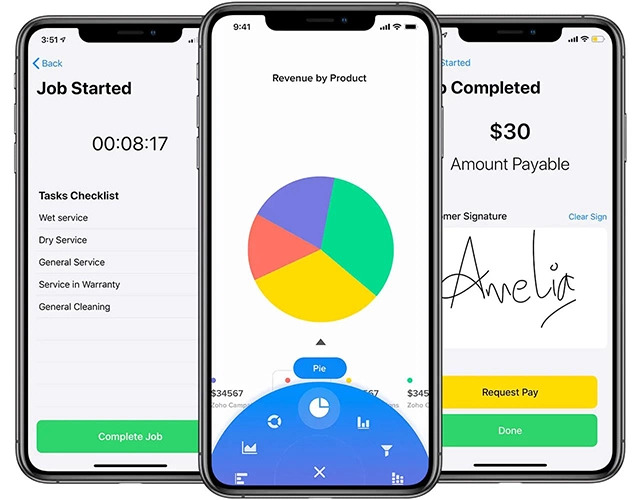
Image Source: Zoho CRM
Pros
- Affordable plans with strong mobile support
- Customizable pipelines and fields work well on mobile
- Built-in workflow automation and AI insights
Cons
- Mobile UI can feel cluttered
- Setup takes longer than simpler CRMs
Zoho’s mobile app makes a solid first impression, but setup isn’t instant. You can get the basics running quickly, yet tailoring it to your workflow—custom fields, tags, and automation—takes some tinkering. Once configured, though, the payoff is flexibility that few other mobile CRMs match.
The core features translate well to phones. Pipelines are easy to navigate, contact records show complete histories, and task reminders surface at just the right moment. Activity logging is seamless when paired with Gmail or Outlook, so you’re not left typing out every call note manually.
Integrations are where Zoho quietly shines. Email, calendar, and even collaboration tools like Slack sync without fuss, so updates flow between mobile and desktop. Offline mode also works reliably: you can add notes or tasks during downtime and watch them sync once you’re back online.
Unique perks like Zoho’s AI nudges are useful rather than flashy. The app flags quiet leads, suggests next steps, and saves you from dropping the ball—all while staying accessible from your phone.
Pricing
Free plan for up to 3 users. Paid plans start at $14/user/month, billed annually.
Helpful next steps
- Read our Zoho CRM review
- Sign up for the Zoho CRM free plan
Visit site
Go to Zoho's official website
Best mobile CRM for visual deal tracking
Pipedrive
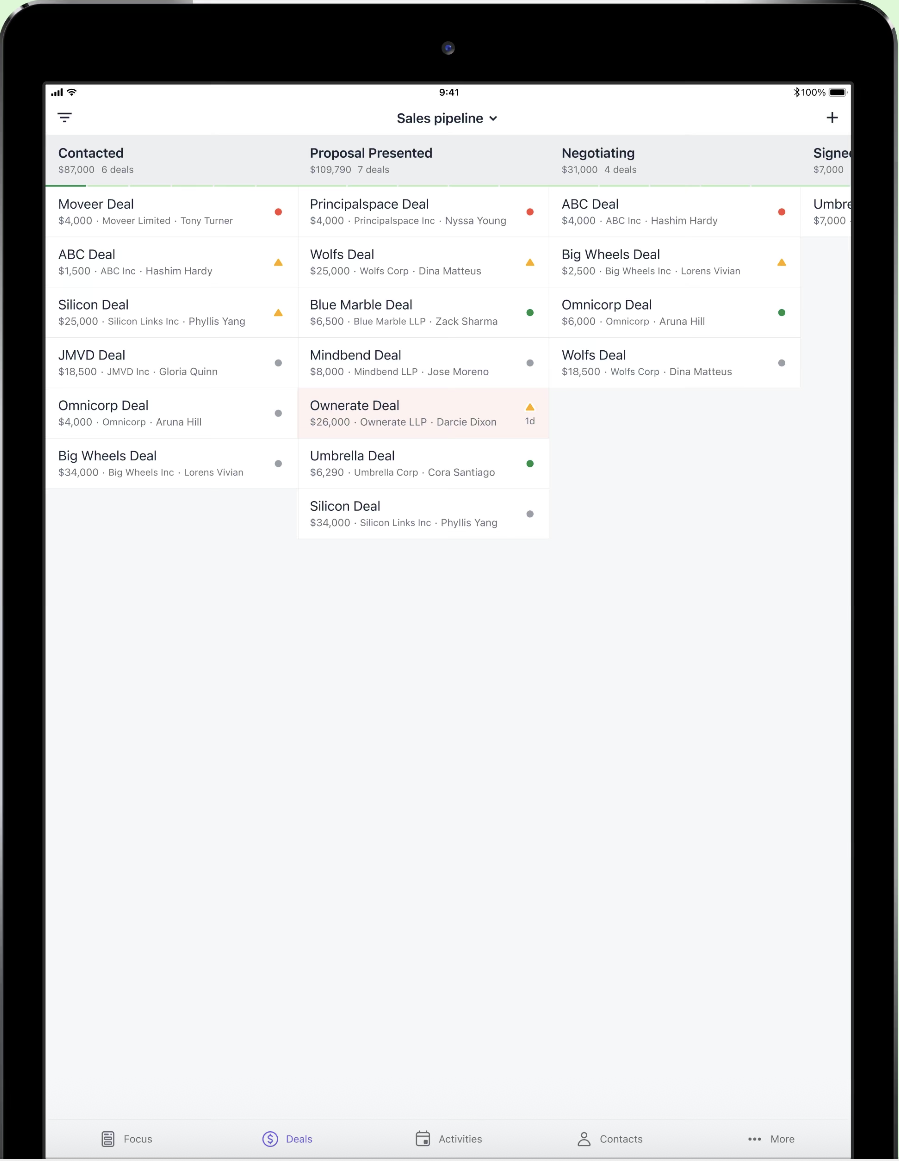
Image Source: Apple App Store
Pros
- Drag-and-drop pipelines are smooth on mobile
- Contact timelines tie emails, calls, and notes together
- Smart reminders keep deals moving forward
Cons
- No free plan, only a trial
- Reporting tools limited at entry tiers
Pipedrive’s mobile app is built for speed, and it delivers on that promise. Setup takes less than 30 minutes, and the learning curve is minimal. Pipelines are displayed as colorful, drag-and-drop columns, and moving deals between stages feels natural even on a smaller screen.
The essentials work reliably on mobile. You can check contact records, log activities, and set reminders without needing the desktop version. Deal timelines combine emails, notes, and calls in one scrollable feed, so you’re never hunting for the last touchpoint.
Reporting on mobile is limited. You can see pipeline overviews and simple metrics, but if you need forecasts or performance dashboards, you’ll have to jump back to desktop.
Integrations with Gmail, Outlook, and calendars sync smoothly. Meetings scheduled on desktop appear instantly in the app, which keeps the workflow consistent. However, if you want integrations with tools beyond the basics, setup often requires third-party connectors like Zapier.
Offline access works only for basic record views; you can jot notes or tasks, but bulk updates or deeper edits will have to wait until you’re back online.
Unique perks like AI nudges are subtle but valuable. If a deal has been sitting too long, the app prompts you to act, which helps prevent pipeline stagnation. Still, more advanced AI insights are reserved for higher-tier plans, and the mobile app doesn’t offer as much customization as the desktop version.
Pricing
No free plan; paid plans start at $14/user/month, billed annually.
Helpful next steps
- Read our Pipedrive CRM review
- Sign up for a free 14-day trial
Visit site
Go to Pipedrive's official website
Best mobile CRM for AI lead scoring
Freshsales
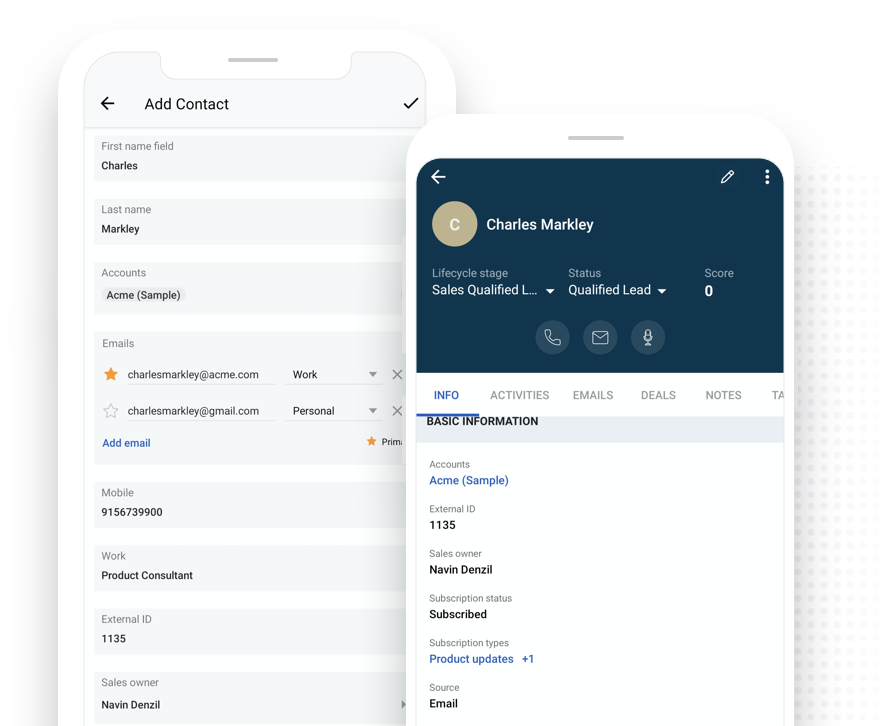
Image Source: Freshworks
Pros
- Quick setup with a clean mobile interface
- AI lead scoring and Smart Views available on mobile
- Automatic email, call, and calendar logging
Cons
- Advanced AI features locked to higher tiers
- Reporting is basic in free plan
Freshsales mobile app feels designed for real-world use. The layout is clean, and navigation between pipelines, contacts, and tasks is straightforward. For small teams, that ease of onboarding is a big plus.
The essentials work reliably on the go. Pipelines display deal stages in a Kanban-style board, contact records store full histories, and task reminders nudge you when deadlines approach. Calls and emails are logged automatically, so you’re not stuck typing notes after every conversation.
Reporting on mobile is fairly limited, and if you need deep dashboards or forecasting insights, you’ll have to switch back to desktop. Offline access is dependable—you can add notes or update tasks during downtime, with everything syncing when you reconnect.
Integration with Gmail, Outlook, and calendars is smooth—meetings appear on mobile without extra setup, and follow-ups sync across devices. Still, connecting some collaboration tools takes extra steps, and you may find yourself relying on Zapier for the smaller integrations.
Where Freshsales stands out is AI. The app scores leads by priority, surfaces reminders when prospects go quiet, and flags opportunities ready for follow-up. Smart Views let you filter leads by score or stage, saving time when you’re triaging on the move.
The drawback is that advanced AI features are locked to higher tiers, which can feel restrictive if you’re on the free plan.
Pricing
Free plan available for up to 3 users. Paid plans start at $9/user/month, billed annually.
Helpful next steps
- Read our Freshsales review
- Sign up for the Freshsales free plan
Visit site
Go to Freshsales' official website
Best mobile CRM for enterprise-grade sales teams
Salesforce Sales Cloud
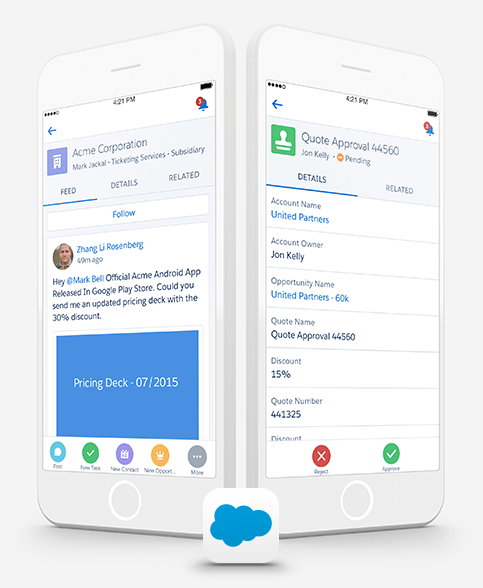
Image Source: Salesforce
Pros
- Powerful mobile app with customizable dashboards
- Offline mode works reliably for notes and updates
- Deep integrations with Gmail, Outlook, Slack, and calendars
Cons
- Steep learning curve without admin support
- Mobile interface can feel overwhelming with too many modules
- Paid tiers are expensive, even at entry level
Salesforce’s mobile app packs in the depth you’d expect from its desktop counterpart, but that comes with friction. Ease of use isn’t its strongest suit and most teams will need admin guidance to configure pipelines, dashboards, and permissions in a way that feels intuitive on mobile. For new users, the sheer volume of options can feel more like a cockpit than a clean dashboard.
The core features are all here, and they work well on phones. Pipelines are customizable, contact records display full histories, and task reminders pop up when you need them. Activity logging is reliable, but the app sometimes buries these features behind extra taps, which slows down fast-moving reps.
Integration is where Salesforce excels. Gmail and Outlook sync tightly, calendar invites flow in automatically, and Slack notifications show deal updates in real time. That said, integration setup often requires admin time, and casual users may find the initial connection process clunky.
Offline access is a bright spot. You can capture notes, create tasks, and even update deal stages while offline, with changes syncing when you reconnect. This makes it practical for reps who travel frequently or work in areas with spotty coverage.
Unique perks include Einstein AI, which nudges you toward deals worth prioritizing and predicts win probabilities. It’s useful but locked to higher tiers, which adds to Salesforce’s already steep cost. Voice-to-text is available for logging calls or notes, but performance varies depending on device and setup.
The biggest drawbacks are complexity and cost. Salesforce’s mobile app is powerful, but not light. Without customization, it’s easy for reps to feel buried in tabs they’ll never use. Pricing also scales quickly, with AI and advanced automation locked to expensive tiers. For smaller teams, this can feel like paying for a jet when you only need a car.
Pricing
No free plan. Paid plans start at $25/user/month, billed annually.
Helpful next steps
- Read our Salesforce CRM review
- Sign up for a free 14-day trial
Visit site
Go to Salesforce's official website
Best mobile CRM for combining sales and task management
monday CRM
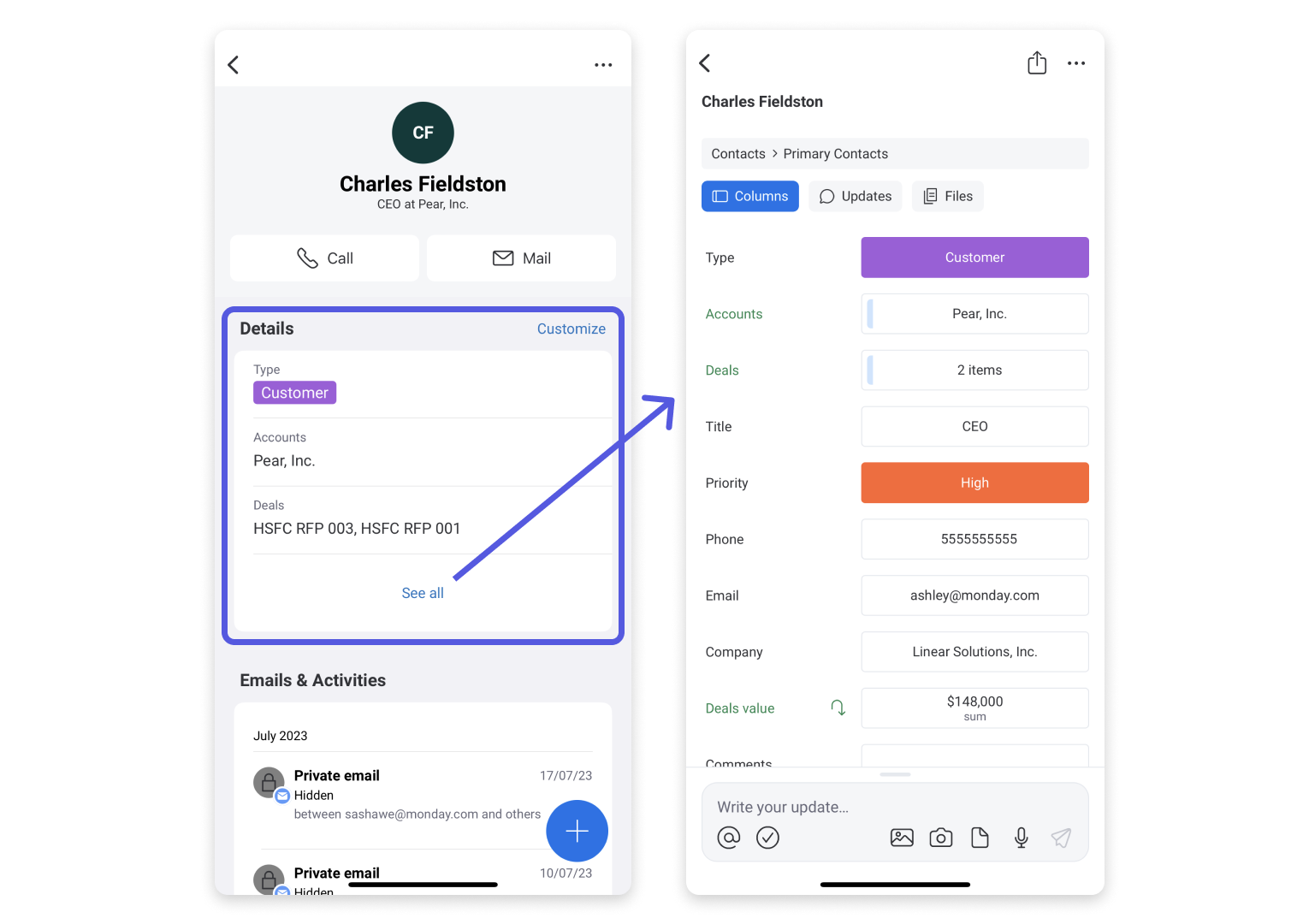
Image Source: monday CRM
Pros
- Colorful, swipe-friendly interface that makes pipelines and tasks easy to navigate
- Combines CRM, task tracking, and light project management in one app
- Automation builder works surprisingly well on mobile
Cons
- No free plan, only a trial
- Offline mode is unreliable and often fails to save edits
- Reporting is shallow unless you upgrade
- Customization can get messy as boards grow
monday CRM feels welcoming when you first open it on mobile. It’s user-friendly and great for sales reps who also juggle tasks and projects, since everything lives in one view. But that friendliness has limits. Once you add dozens of deals and automations, the boards start to feel cluttered, and navigating them on a phone can get frustrating.
The essentials are there. You can drag deals between stages, open contact records, assign tasks, and log activity directly in the app. Reminders work reliably, nudging you to follow up. But logging calls and meetings is mostly manual. There’s no automatic capture like you’ll find in Freshsales or Salesforce.
Integrations with Gmail, Outlook, and Slack are smooth, and you can trigger notifications or task creation from deal changes. Where monday falls short is with less common tools: unless you’re willing to lean on Zapier, many connections just aren’t there.
Offline access is another sore point. You can view boards, but edits often fail to sync if you’re out of service, leading to lost notes or duplicate entries.
Its unique perks are the automation builder and AI helper. You can string together simple rules like “when a deal moves to Won → send a follow-up email → assign onboarding task.” The AI assistant can also draft short messages or summarize meetings, though it’s basic compared to dedicated sales AI.
The real trade-offs: monday CRM is flexible but leans more toward project management than sales rigor. Reporting is thin at lower tiers, so if you need forecasts or pipeline analytics, expect to pay more. And while the app is easy to pick up, scaling it for a growing sales team without creating clutter takes real discipline.
Pricing
No free plan. Paid plans start at $12/user/month, billed annually.
Helpful next steps
- Read our monday CRM review
- Sign up for a free 14-day trial
Visit site
Go to monday CRM's official website
Best mobile CRM for Google Workspace users
Copper CRM
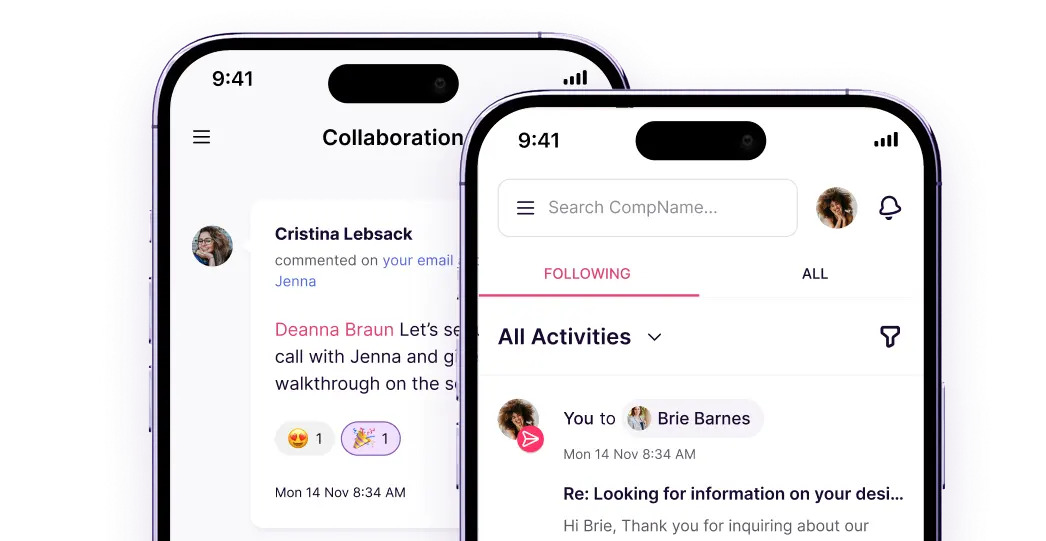
Image Source: Copper CRM
Pros
- Lives inside Gmail and Google Calendar with minimal setup
- Clean, modern interface consistent with Google’s design language
- Auto-logs emails, meetings, and tasks without extra clicks
Cons
- No free plan; pricing starts higher than some rivals
- Limited functionality outside the Google ecosystem
- Reporting is basic compared to full-featured CRMs
- Offline access is barebones and misses advanced edits
Copper CRM’s mobile app feels like a natural extension of Gmail and Google Calendar. Setup is quick and the interface borrows Google’s clean look, so it doesn’t feel like a foreign tool. For teams already deep in Google Workspace, that consistency reduces friction. But if you’re not fully in the Google world, Copper quickly feels limiting.
The essentials are covered in the mobile app. Pipelines are easy to scroll through on mobile, contact records include emails, calls, and notes, and reminders nudge you to follow up. I liked how recent email threads and calendar events appeared directly in contact timelines.
The trade-off: while basic tasks are smooth, more complex workflows, like bulk updates or advanced reporting, still require the desktop app. Offline access is limited too: you can view records and jot down notes, but creating or editing deals offline is inconsistent, with sync errors not uncommon.
Integrations are Copper’s strength and weakness. With Gmail, Calendar, and Drive, syncing is seamless; you don’t even notice it’s happening. But beyond Google, the app offers little. If your team also relies on Outlook, Slack, or specialized tools, you’ll be stuck patching with Zapier or going without.
Copper’s perks are subtle but valuable. Emails are logged automatically, tasks can be tied directly to calendar events, and the app suggests next steps when threads go quiet. That saves real admin time. However, reporting is thin on mobile—you won’t get forecasting dashboards or AI-driven insights here.
For small to midsize teams fully inside Google Workspace, Copper feels light and efficient. For everyone else, it may feel boxed in.
Pricing
No free plan. Paid plans start at $9/user/month, billed annually.
Helpful next steps
- Read our Copper CRM review
- Sign up for a free 14-day trial
Visit site
Go to Copper's official website
Final thoughts: Choosing your mobile CRM
The right mobile CRM doesn’t just mirror your desktop—it makes your workday lighter when you’re away from it. Whether you’re logging a quick note after a client lunch, checking a pipeline while commuting, or prepping for a meeting on the fly, a solid mobile app means nothing slips through the cracks.
You don’t need to overthink it. Start with the tool that matches where you are now: a free plan if you’re testing the waters, a customizable app if you’ve got unique workflows, or an enterprise option if compliance and reporting are non-negotiable.
Test it with real contacts, real calls, and real reminders. You’ll know when it clicks.
Still exploring? You may find these guides helpful:




